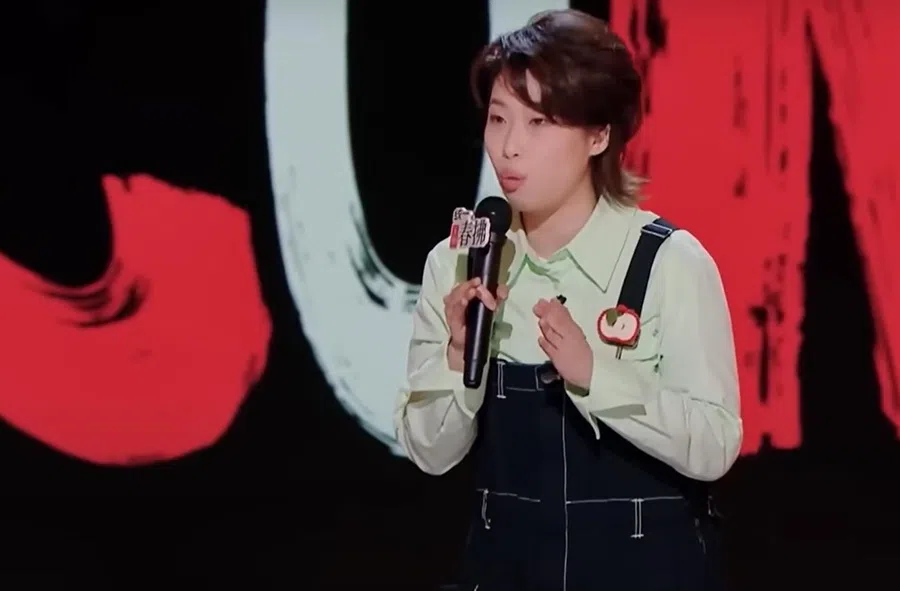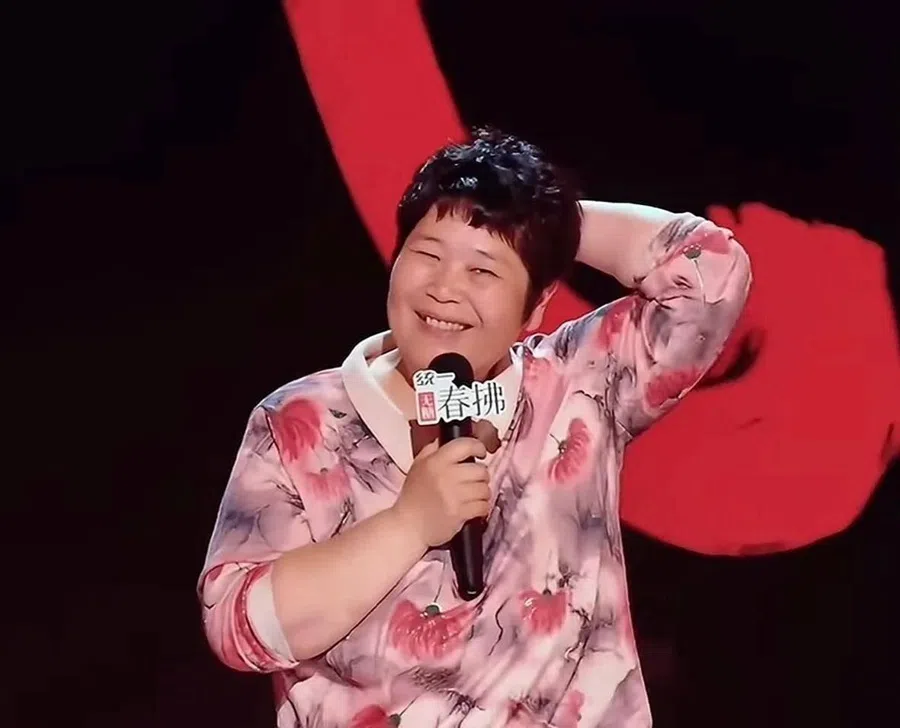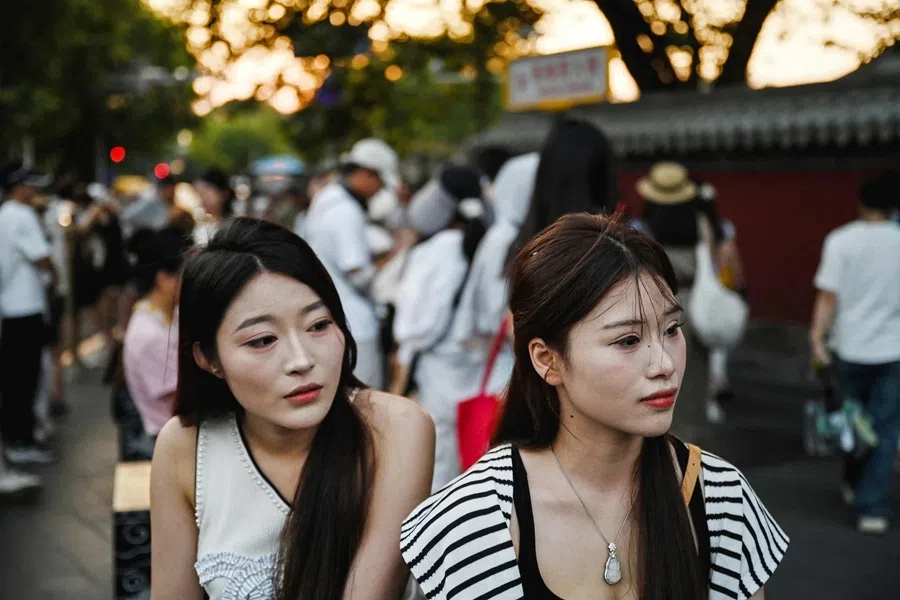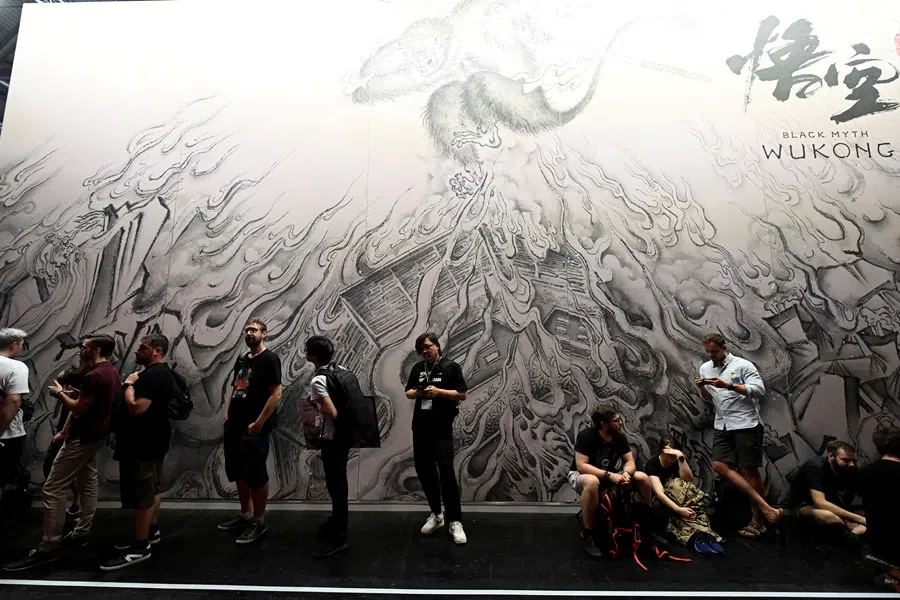[Big read] Why China’s funniest women are also its most controversial

As Chinese female stand-up comedians challenge deep-rooted gender norms, critics accuse them of fuelling gender divides. But comedy is only exposing what has long festered across film, gaming, and public life. Lianhe Zaobao journalist Zeng Shi finds out more.
In her leisure time, Shanghai lawyer Huang Feiling enjoys watching stand-up comedy shows to unwind. This year, while watching the latest season of China’s stand-up comedy competition, she sensed a clear increase in the proportion of female performers and gender-related topics.
As a professional who has to stay rational amid legal texts and case details, Huang is particularly sensitive to such changes. In this season’s competition, female performers have brought their personal experiences and collective challenges on stage more directly, humorously publicising topics once considered “personal and private”.
Performer Yueming (stage name 月明) explored a new mode of gender dynamics on stage: in her relationship, she supports the household financially while her boyfriend tends to their emotional connection. Another comedian, Wang Yue, spoke candidly about the suffering caused by menstrual pain. After seeking medical advice, she was bluntly told, “Find a man and have a baby — it’ll get better.”
Getting critical with bold, sassy remarks
Fifty-year-old comedian Director Fang (stage name 房主任) from rural Shandong, has emerged as the “dark horse” of this year’s Chinese stand-up comedy scene. With sharp wit and emotional honesty, she recounts her struggles in an arranged marriage marked by domestic violence, gambling and infidelity. Her parents opposed her divorce, calling it “shameful”, but after enduring three decades of hardship, she chose to restart her life. With the support of her two daughters, she left her old world behind and found a new beginning in stand-up comedy.
“The young these days have an expression for very thin men — ‘skinny dog’. Well, my mother picked a corgi for me 30 years ago.” This middle-aged woman’s bold, sharp-tongued reflections on her ex-husband and marriage revealed a resilience and clarity forged through hardship.
In 2020, comedian Yang Li’s satirical performance on “Why are men so ordinary yet so confident” led to the term “average yet confident man” quickly going viral, but it also placed her at the centre of a storm of public opinion.

Huang told Lianhe Zaobao that Director Fang’s stand-up routine — centred on refusing to resign to fate in the face of adversity — resonated deeply with many audience members who had faced similar struggles. However, some male viewers reportedly felt offended, perceiving aspects of her delivery as containing “insulting elements”.
Online, reactions were mixed: while some netizens accused Fang of promoting “gender opposition” under the guise of a female perspective, others questioned the authenticity of her story, suggesting she might be deliberately “playing the victim”.
The “art of offending” that is stand-up comedy has gradually become widespread in China in recent years, accompanied by debates over performance boundaries and the limits of expression. In 2020, comedian Yang Li’s satirical performance on “Why are men so ordinary yet so confident” led to the term “average yet confident man” quickly going viral, but it also placed her at the centre of a storm of public opinion. Last year, during the “Double 11” shopping festival, China’s e-commerce giant JD.com invited Yang as a spokesperson, only to face a massive male boycott, leading to JD.com announcing the termination of their collaboration with her.
The frequent controversies surrounding stand-up comedy have often led to public opinion crises for this comedic form. In mid-July, WeChat public account “Zhejiang Propaganda” under the CPC Zhejiang Provincial Committee Propaganda Department published an article reminding people to beware of stand-up comedy “sliding into the quagmire of gender opposition”. The article criticised that some stand-up content is “deviating from the original intent of humour”, simplifying gender issues and repeatedly exploiting “male-female opposition” issues.

The article said that once stand-up comedy falls into the vicious cycle of stirring gender opposition emotions to gain traffic, it would lead to “losses on multiple fronts”, such as weakening the social function of comedy, squeezing the space for rational discussion and harming the long-term development of the industry.
... it draws on gender tensions without advancing gender equality. “From this perspective,” he said, “Chinese stand-up comedy is not bold enough.” — Associate Professor Wu Changchang, School of Communication, East China Normal University
Gender issues in place of politics
Wu Changchang, associate professor at the School of Communication at East China Normal University, believes there is some validity to the official criticism. However, he warns that without naming specific individuals, such blanket critiques risk undermining cultural works that genuinely aim to promote gender equality. “I think it should specifically name names,” he said.
Wu noted that gender opposition and the push for women’s rights were not originally central to stand-up comedy. But in China — where political satire is off-limits — comedians have turned to gender issues as a safer outlet, with some exploiting gender themes for visibility and profit. In his view, Chinese stand-up rarely engages with truly controversial gender-related events or incorporates them into meaningful discussion. Instead, it draws on gender tensions without advancing gender equality. “From this perspective,” he said, “Chinese stand-up comedy is not bold enough.”

Zhou Xiaopu, a professor at Renmin University’s School of Journalism and Communication, observed that rising female consciousness and shifting gender roles — within a historically patriarchal society—have naturally fueled public debate around gender. As a form of art that reflects social reality, stand-up comedy inevitably engages with these issues. She added that gender discourse online tends to gain rapid traction and emotional response, making it a particularly sensitive topic in today’s environment.
Stream of gender-related incidents
As a form of popular culture, stand-up comedy reflects and expresses social realities. In online discourse, gender issues have long been sharply contentious, as they touch on deeply held beliefs and value differences. A stream of gender-related incidents quickly goes viral, often framed through “gender alignment”, sparking rapid debate and emotional clashes between opposing camps.
His mother claimed he had simply been scratching an eczema flare-up through his clothes, not engaging in inappropriate behaviour.
A 2023 incident at Wuhan University sparked ongoing controversy after a female student accused a male classmate of sexual harassment in the campus library, triggering public outrage. Although the university intervened and issued him a demerit, he was doxxed — his name, photo, address, phone number, and social media accounts were maliciously exposed — and was later diagnosed with PTSD. His mother claimed he had simply been scratching an eczema flare-up through his clothes, not engaging in inappropriate behaviour.
The case took several turns, fuelling fierce online clashes between supporters on both sides. Public debate soon expanded beyond gender to include broader concerns over online whistleblowing and the influence of public opinion on judicial outcomes.
In late July 2025, the court issued a first-instance ruling, finding that the male student’s actions did not constitute sexual harassment and that it was highly likely he had just been scratching. The female student responded by vowing to continue reporting him, aiming to block his future academic and career opportunities.

In 2024, a netizen known as "Fat Cat" died by suicide, reportedly after emotional and financial abuse from his girlfriend. This tragic incident sparked widespread online attacks against the girlfriend, who was branded a "gold digger" and portrayed as manipulative and materialistic, igniting another wave of online vitriol.
On Chinese platforms like Douyin and RedNote, topics tagged with labels such as “woke women”, “feminazi” and “gold digger” frequently dominate traffic, intensifying the sense of gender division in public discourse.
Online battle of the sexes
Xiaolin, a recent university graduate from Guangzhou, told Lianhe Zaobao that online discussions on social issues are often driven by emotional viewpoints. He believes many netizens do not hold strong or clear stances but tend to sympathise with or endorse certain views based on their own values, often unintentionally aligning with one side or the other.
Xiaolin thinks that the online gender divide is not simply a battle between men and women, but rather a clash between groups with different values. As a 24-year-old man, he sometimes finds himself unhesitatingly siding with women.
Algorithm designs on social media platforms play a key role in online dissemination. On Chinese platforms like Douyin and RedNote, topics tagged with labels such as “woke women”, “feminazi” and “gold digger” frequently dominate traffic, intensifying the sense of gender division in public discourse.
On short-video platforms, some relationship content creators advise young women to adopt a “gold digger mindset” and stay clear-headed in romance, while some male content creators earnestly caution men to “recognise and deal with gold diggers”.
A netizen on RedNote commented that staying neutral hardly gains traction nowadays, stating that extreme or opposing opinions are more likely to spark discussion and attract attention.

A content creator herself, Huang noted that gender topics hold one of the keys to traffic in online discourse at the moment. Content involving the gender divide tends to attract more attention and spark disputes, encouraging likes, shares and emotional reactions. Across major platforms, many creators now actively focus on gender-related topics in their work.
A netizen on RedNote commented that staying neutral hardly gains traction nowadays, stating that extreme or opposing opinions are more likely to spark discussion and attract attention.
In recent years, Chinese regulators have intensified efforts to curb online content that “incites extreme divisions”, prompting platforms to take action against gender antagonism. In late August, Weibo issued notices for three consecutive days, stepping up its crackdown and suspending or banning numerous accounts.
Zhou noted that internet platforms now wield far more influence than traditional media and should bear responsibility for promoting rational public discourse. However, driven by profit and a desire to avoid regulatory trouble, these platforms often lack the will or capacity to guide conversations in a constructive direction.
Discrimination against women across sectors
Clashing values and the redistribution of social interests during China’s transition have fueled growing gender tensions and controversies. Beyond stand-up comedy, gender antagonism and bias have long been present in gaming, publishing, and entertainment.
Black Myth: Wukong, which gained global attention after its release in August last year, was embroiled in controversy over alleged misogyny. The development team was accused of discriminating against female players, and the absence of female characters in the demo version was seen as a reflection of gender bias within Chinese gaming culture.
In films and TV dramas, female characters are said to be underrepresented and often depicted as weak or passive, lacking initiative and independent thinking.

Another title, interactive full-motion video game Revenge on Gold Diggers (《捞女游戏》), which was released on the gaming platform Steam in June, also sparked a major backlash. Its name and content were criticised for stigmatising women and portraying them as deceitful stereotypes, with the game’s comment section being flooded with misogynistic remarks. Amid the uproar, it was quickly renamed Emotional Fraud Simulator (情感反诈模拟器).
Criticism has also been directed at the cultural and creative sectors, including film and television. Some books have been accused of reinforcing gender stereotypes in their portrayal of male and female characters, potentially deepening social bias. In films and TV dramas, female characters are said to be underrepresented and often depicted as weak or passive, lacking initiative and independent thinking.
Commenting on gender debates in Chinese society, Wu noted that feminism should not be confined to verbal sparring. Many online controversies remain at the level of arguments or deliberate provocation, offering little substantive value. At the same time, some films and variety shows have co-opted “feminism” as a marketing tactic to attract attention, without genuinely contributing to the advancement of gender equality.
...effective gender discourse must go beyond rhetoric and be translated into concrete action, such as implementing laws, regulations and policies that promote gender equality, or practical measures like increasing the number of female toilets... — Wu
Gender equality: laws, toilets, progress
Wu thinks that effective gender discourse must go beyond rhetoric and be translated into concrete action, such as implementing laws, regulations and policies that promote gender equality, or practical measures like increasing the number of female toilets — only then can real progress be made.
Meanwhile, Zhou emphasised that meaningful discussions on gender equality require broad social participation, with individuals and organisations of different genders and backgrounds working together to foster healthy societal development.
She added that internet platforms should play a constructive role by creating space for rational dialogue and minimising emotional confrontation. Achieving this, she noted, will require joint efforts from platforms, regulators, and other stakeholders—including the establishment of clear standards and guiding principles.
This article was first published in Lianhe Zaobao as “捞女杠普信男 脱口秀挑动两性对立博掌声”.





